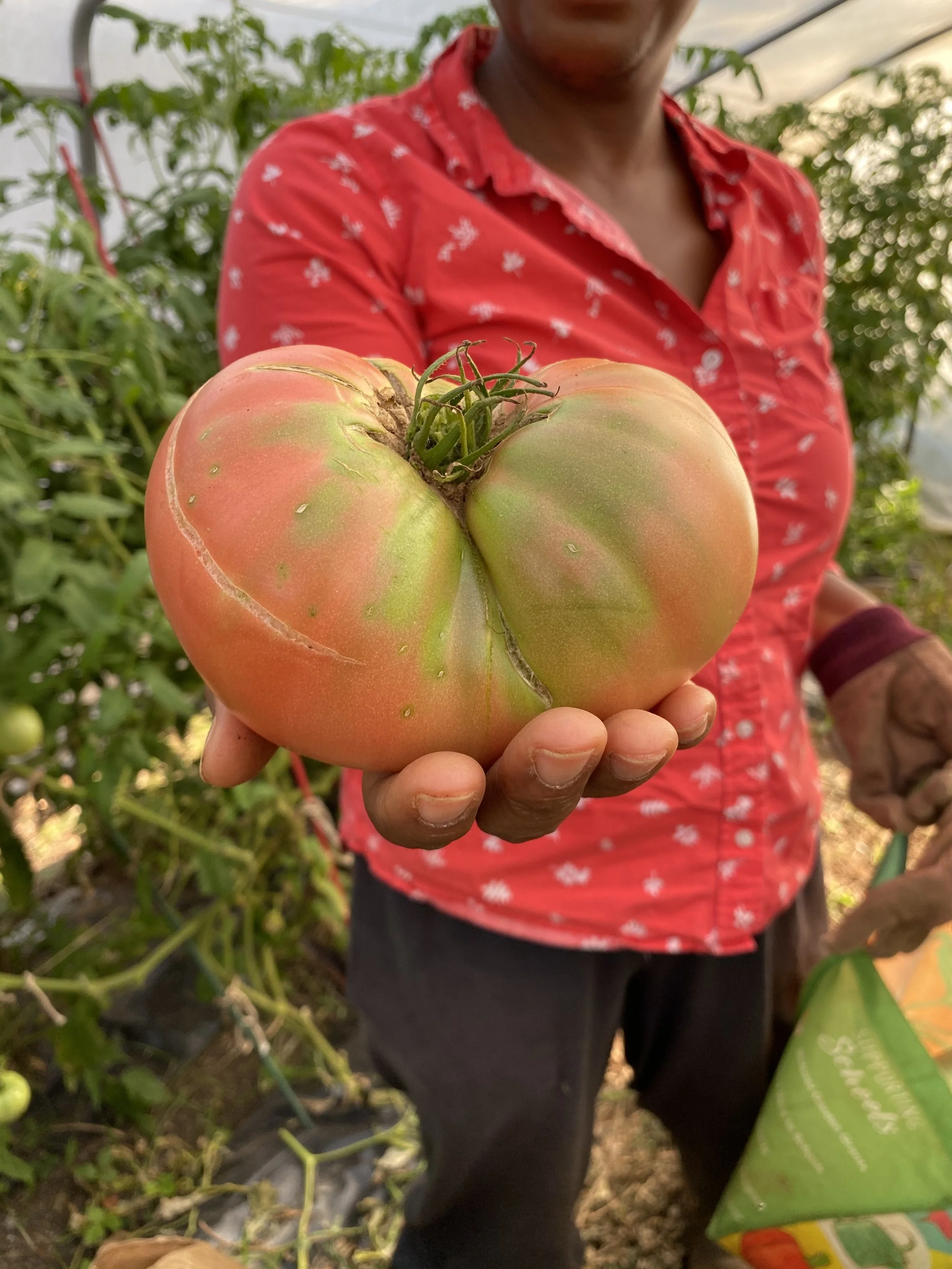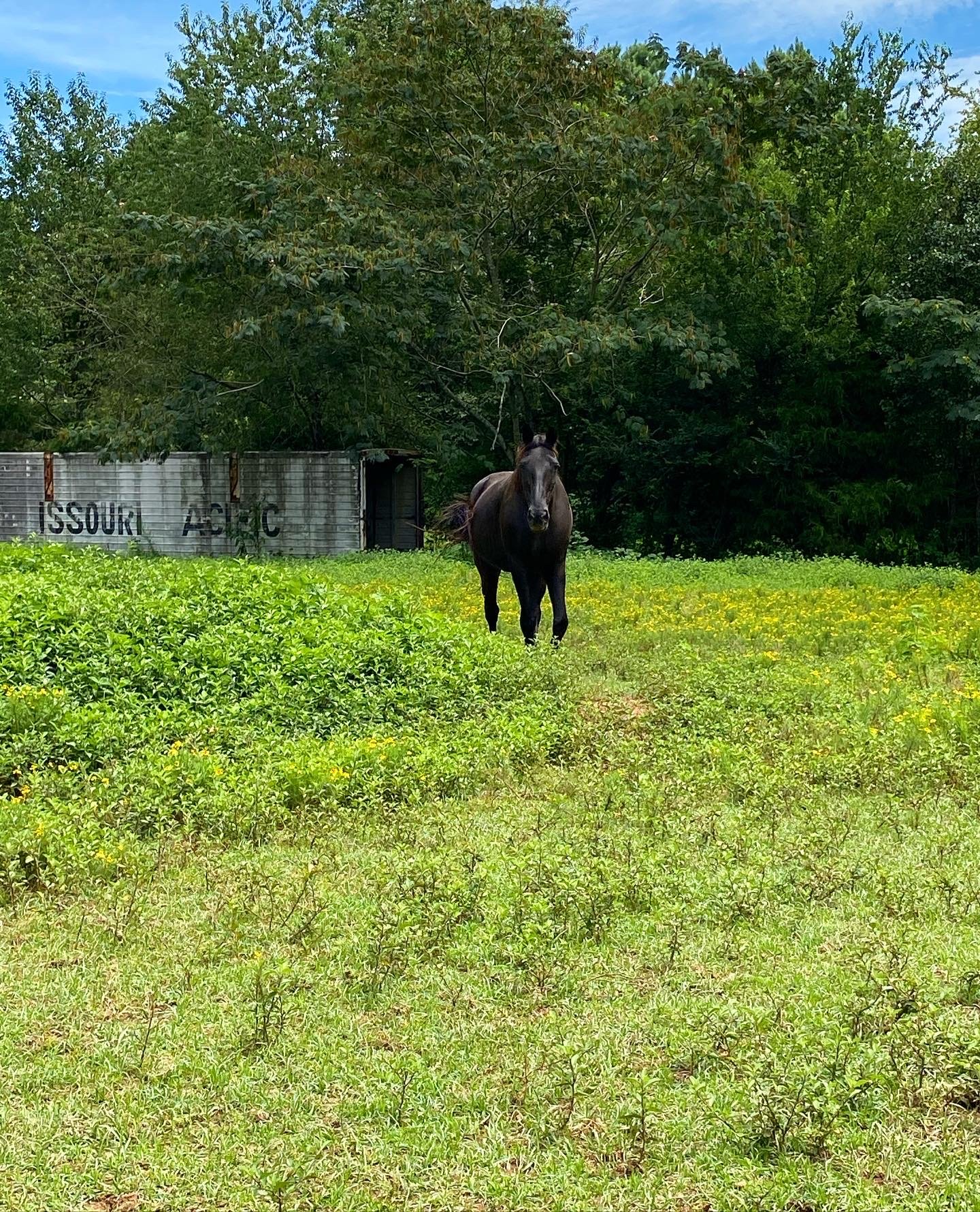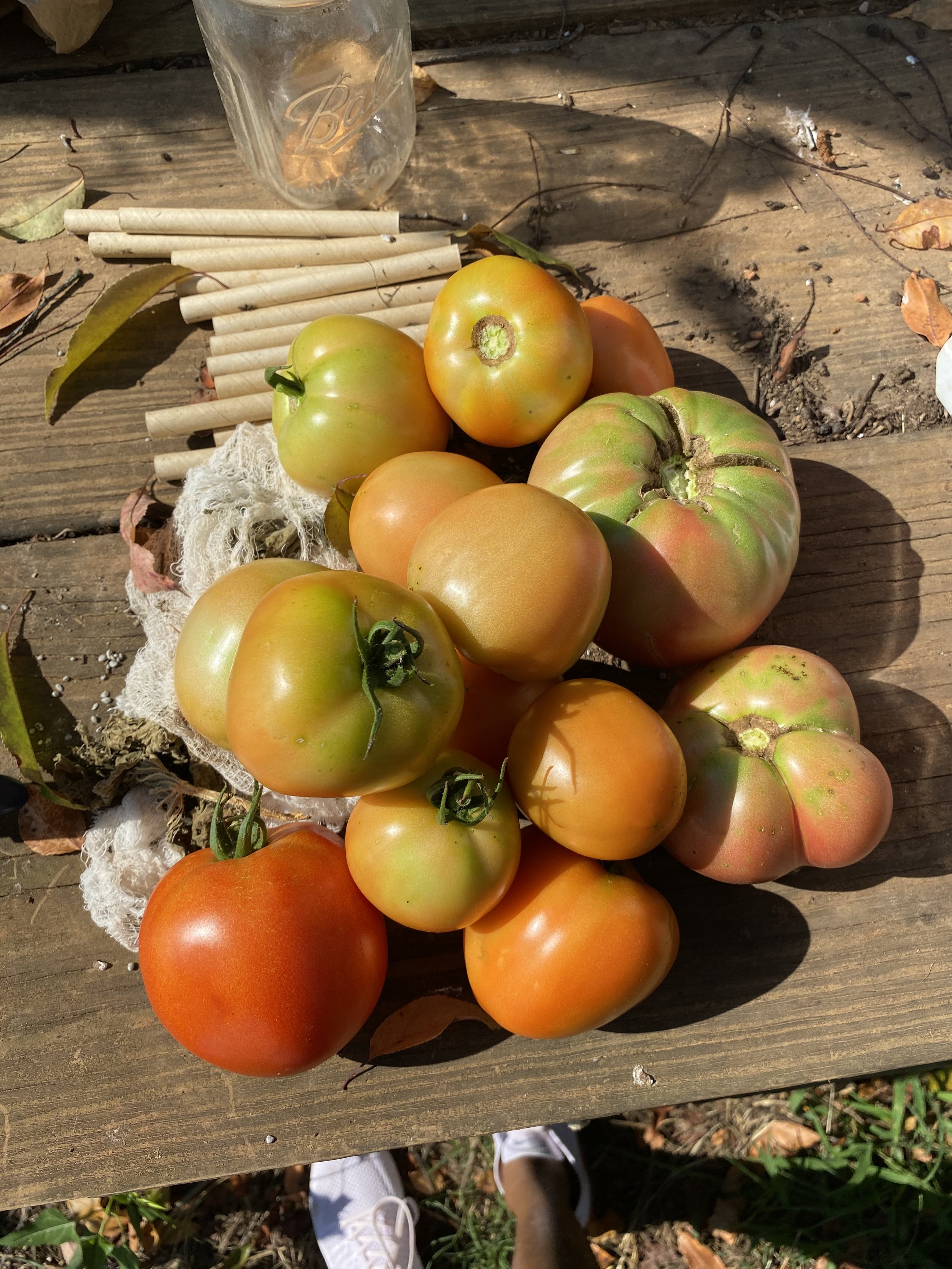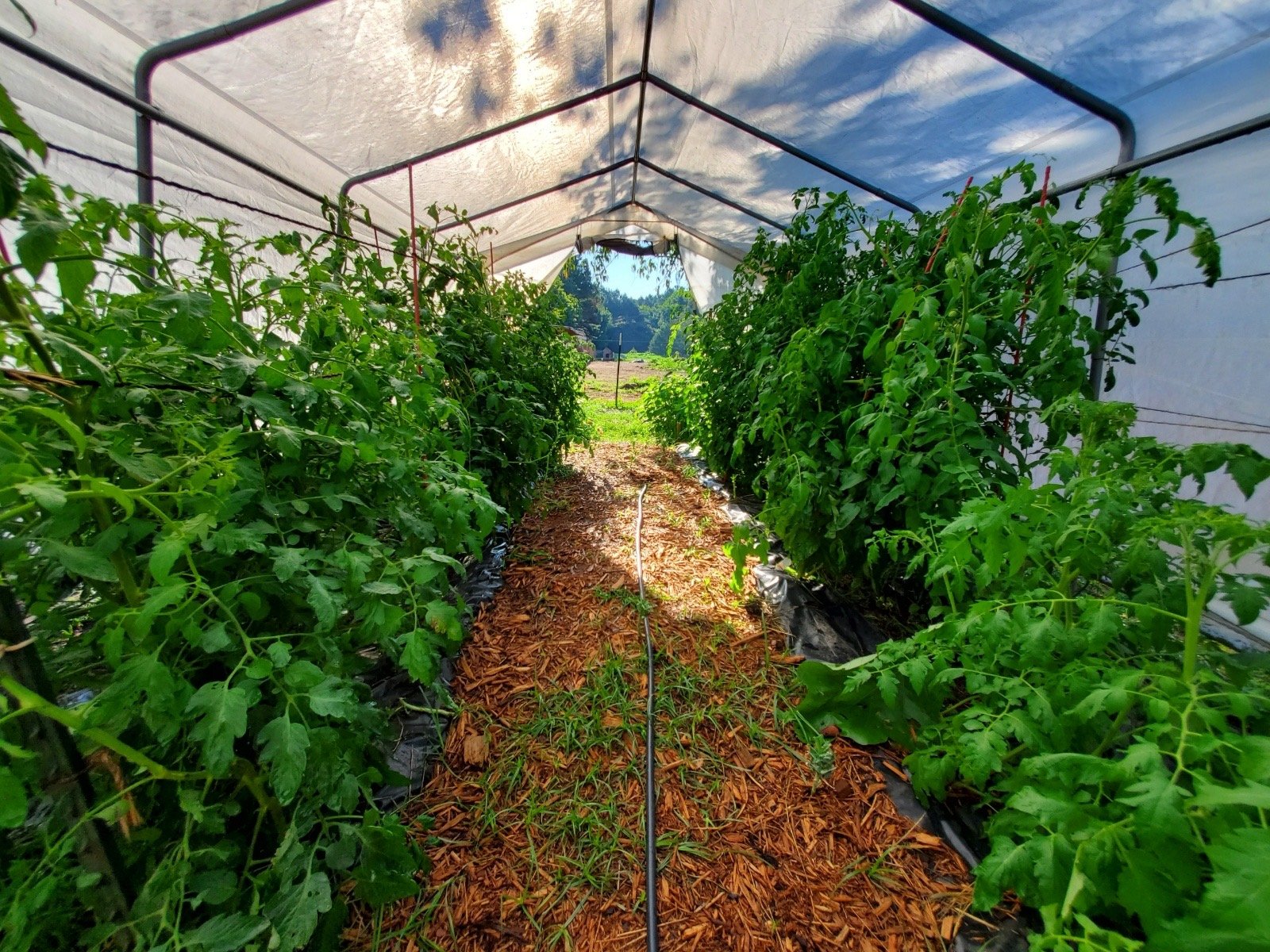Synclaire Taylor Talks Self-Sustainability
Photos courtesy of Synclaire Taylor.
Note: This article was published in our OCT 2020 Issue on October 31, 2020.
DC, New York, South Carolina, Alabama and Atlanta – Synclaire Thomas has called many different places home. What hasn’t changed though, is her unwavering dedication to imagining new worlds in her work and making that accessible no matter where she is.
Growing up on a farm in Alabama, Synclaire developed a deep appreciation for herbalism, and natural produce. At the same, her mother worked in the non-profit sector. Her foundation HaveiHope, distributes fresh produce and edicates on agriculture and nutrition.
Now, in light of her recent return to Alabama, she has teamed up with her mom to co-found a beauty business. One that perfectly combines the duo’s love for fresh ingredients and commitment to their community, Lous Organic Skincare.
Unlike other companies; Synclaire is not intent on keeping any trade secrets. In fact, one of the tenants of Lous Organic’s vision, is to teach people how to do things themselves. What this illuminates is a component of sustainability lost both on the beast of capitalism and brands who claim to practice sustainability: self sustainability.
Below, Synclaire talks about her vision for Lous and a world where money doesn’t exist.
Why did you go to Howard and what did you study?
I always had an interest in cultural anthropology growing up. Howard was one of the only ones to give me a full academic scholarship. Once I got there I just realized, “Woah there's so much to this school. The history and the legacy and all the people that have come from that institution.” But unfortunately the year I graduated high school they ended their anthropology program. So I changed my major to art history. I have always been creatively inclined and art is an expression of human history as well. Studying that kind of brought me into this headspace of doing everything yourself. Find ways to create something beautiful for yourself, that’s a reflection of your inner world and how you perceive your outer world as well. Being in an institution and interning at the Smithsonian, working in an art institution made me realize I wanted a more grassroots, hands on approach to instruction.
That also roots from my background doing community work with my mom. She’s always worked in the community doing education.
Through friends who were native to DC, I began to branch out from Howard and get involved in the creative scene there. It was such a blessing because I found that there were so many people already operating in the way I wanted to express myself in art. Dc had a major impact on me creatively.
How would you describe what you do now with Lous Organics, as compared to then? Is it still an art?
Right now I’m trying to find new ways to express myself, and new ways of speaking to that inner self that I feel disconnected to right now. There are things like fashion design, that I feel like I’ve evolved out of, but I’m not sure what I’m evolving into.
You said you have a background in community work because of your mom, can you tell me more about that?
When I was 10 years old my mom started her first non-profit geared towards teaching impoverished communities about nutrition, holistic lifestyles and how to grow your own food. She would go into communities and get people together to plant community gardens and she would lead seminars. I would always be there, little helper type vibes. But even before that, my family always kept a garden.
What inspired you to start Lous Organics with your mom?
So, I always struggled with eczema growing up. Instead of using steroids or antibiotics, my mom wanted to find a more natural route for healing it. What the doctors were prescribing wasn’t healing anything. So she started making all kinds of salves for my skin. That led her into making natural hair care products and things like that. She stopped for a really long time, so when I moved back to the farm in Alabama, I knew I wanted to start a business. And I Wanted that business to be for my family. I was like “Hey you should start doing that again. I can help you and we can turn it into a business.” So we started developing the idea. She got excited and it took off from there. So much of my mom's life is about teaching and the non-profit, so it was a nice outlet for both of us.
What’s the vision for Lous Organic?
The biggest goal that we have is to make organic skin care accessible and to also have an educational aspect as well. We not only want to produce these products, we're working on a holiday campaign to donate products to moms in need and women who we've met in the non-profit work that we're doing. Eventually we want to hold workshops so that people can learn how to make their own body butters and teach the knowledge of herbalism which is the foundation of everything that we do.
When you talk about teaching people to do it themselves. That’s so important because capitalism is predicated on the fact that “You can't do this, and I can, so I get to charge you whatever I want.” That aspect of autonomy is so lost in the “free market.” What are thoughts, if you transferred that ideology to food? We're so far away from our food.
It's honestly wild. I’m really privileged because I’ve been able to grow food, see food being grown my whole life. My mom is a doctor of agriculture so it’s something I’ve always been exposed to. But this summer my boyfriend came to the ranch and helped us plant everything that we were going to distribute to the community in the fall. It was wild seeing how he experienced it. He had no ideas about the growing process. Like you said were so far removed from our food and the process, and even how easy it is.
How do you spread the desire to grow your own food, when so many are living in tiny Brooklyn apartments getting everything from the corner deli? I feel like a lot of people would think of growing food in a city as a rich person's hobby.
We don’t have any fancy equipment at the farm, a lot of the time we're just building things ourselves. You can just buy a container and put soil in it and plant something. It doesn’t always have to be a whole operation. Just a couple things at first. It doesn’t have to be from a seed either, you could buy a whole plant and start it that way. We have to shift the thinking from that it’s a luxury thing and start thinking of it as a necessity. As things get crazier it’s going to be more of a necessity to have that knowledge of being able to grow your own food.
You can really just google ‘how to start a patio garden’. Everything is easier when you have a community, too. When you’re not doing it alone it seems a little less intimidating. There are a lot of people who are homesteaders who had nothing and just used what was around them.
Homesteaders. Wow what a word. That reminds me of a lost time. What does it mean to you?
Honestly, having left New York and moving back to Alabama was such a culture shock. I remember the first time I helped my mom plant the greenhouse. I was like where do we start? We literally had a hoe, a wagon and a shovel. I hadn’t done it in so long, I went straight from DC to New York and I forgot that it was hard work. But it was so rewarding and that’s the beauty of homesteading. You have to decide that you don’t want anyone to have control over your food, or your lifestyle. Like I went to a family farm and killed my first chicken. It was crazy!
People really forget that the food we buy at the store used to be an animal that had to be killed. We’re not just physically removed from our food, we’re emotionally and psychologically removed.
Yes exactly. The mom in the family gets a lot of slack because her kids are homeschooled but she’s a teacher. So she’s like yea your kids are going to school but my kids know how to survive. They know where their food comes from and they have an appreciation for life and nature and all those things. And in a lot of ways that could be a lot more valuable.
Now that I’ve experienced that, even being in Atlanta is hard. I’m trying to make these conscious decisions, what's good for me, what's good for the environment even though I'm geographically and physically disconnected from it at this moment. I hope one day I can return to that and it will be a permanent thing.
That's the goal. I’m always thinking about the line that people who care deeply about people and animals and nature walk between caring and also needed to pay rent and build a business in a capitalist structure. How do balance all of these very anti-capitalist goals with making money?
It’s hard because it's like you're trying to make puzzle pieces fit together that don’t fit. It’s very frustrating. The main reason I moved to Atlanta was because I took a sales job so I could put more money into Lous. It’s been hard to be here for that reason because it is so heavily against what I’m about. I’ve spent the last year and a half grinding so that I can have money. But some things are a necessary evil. This is a means to an end, until everything I’m working on is self sustaining. I keep that perspective so that it’s less depressing. I remember that I’m trying to educate people, teach people how to do things themselves which is a “fuck you” to capitalism. IT’s negating the idea that you have to rely on people's lack of knowledge to operate successfully. That shouldn’t be the case at all. The more we empower people, the more we empower ourselves and our world and it can become a better place. Hopefully money one day can become obsolete.
I hate money.
It’s so fucked up. The power it has is disgusting.
To go on that line of thinking, How do you feel about sustainability being like a trendy buzzword in marketing?
Constantly when Im; on instagram I'm getting ads about sustainable products. Organic, natural. But I’m like but are you really? Are you empowering people through your sustainability? Cause that’s really what it’s about. Building knowledge and teaching people how to do things for themselves. A lot of companies aren’t doing that. I think the awareness is positive, but I think it needs to be more about teaching people to do it themselves, rather than selling them something.
So many people think about sustainability only as renewable energy, or recycling materials but it is teaching people how to do things themselves and making knowledge accessible. Brands and companies are overlooking that aspect of sustainability.
Self sustainability is the whole point. Being able to create a system where everything that is contained inside it keeps it operating. You don’t have to give your money to someone else. We can’t even imagine what that would look like now. It’s such an abstract thought. That’s how the system is built, it keeps up looking inwards and not at the environment outside ourselves and the part we play in it.
Do you think constantly looking in is toxic in that way?
If there’s no moment to look outside yourself, then yeah. A lot of us don’t realize that we’re not taking those moments until we're forced to. But there are also a lot of unhealthy ways to look outside ourselves. Like if we're only looking at the media and not the natural world. That’s what I mean when I say looking outside of us, just witnessing the natural world around us.
I feel like that happened in June. People started looking outside of themselves but they were looking at the news and media. And so when the media moves on, so do they. They weren’t looking in the communities around them. I feel like so many people were trying to fit into this one size fits all internet activism, instead of looking at what their unique skills were.
What you can contribute yourself in a genuine way. Think about how you can make a change, it’s not going to be the same to everyone. We need to make sure we're using the skills and gifts that come naturally to us.
Earlier you said that your sales job was a means to an end? How do you imagine that end for Lous Organics and your work in sustainability in general?
I want to create a marketplace that also acts as a teaching space. That has been my vision for a while. I want to create the world that I envision, but on a small scale. so that people can visit and take advantage of the resources. I’m retraining my ideas of what success is for Lous and the non-profit because it’s ever evolving. I really don’t know. I just want to be able to give back. Change can just be reaching one person, just making sure that one family has enough to eat until they get their next round of food stamps.Letting someone know that there’s someone out here who cares about you and is going to look out for you. That’s change. It doesn’t matter how small it is, it just matters how you do it.








